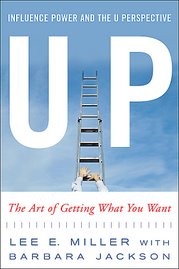
What determines why one person is selected for a job or a promotion and another is not? Most people believe that the answer to that question lies with the qualifications of the individuals being considered. If, like most people, you answered that the candidate with the most relevant skills and experience gets the job, you would be wrong. If someone is able to obtain a job interview or is being considered for a promotion, they are likely to be qualified to do the job. However, so are all the other candidates being considered for the position. The key to being selected is to distinguish yourself from all of the other qualified candidates.
Standing out from the crowd has more to do with your understanding of the employer’s U Perspective than it does with your qualifications. An employer’s U Perspective is ‘what they care about.” Employers are not looking for the candidate with the best qualifications because there is no such thing as the “best qualified candidate” in the abstract. There is only the best candidate for a particular job as the person or persons making the decision see it. To show that you are the right person for the position you are seeking requires understanding the U Perspective of the people involved in making the decision to hire or promote you.
While in most organizations there are a common set of shared values referred to as the organization’s culture, you don’t interview with an organization. You interview with individuals. For most jobs, you will have to interview with more than one person. Each person who interviews you sees the job somewhat differently. They define the perfect candidate as the perfect candidate for them. To convince an interviewer that you are the right person for the job, you need to figure out what the interviewer cares about.
How each person defines that ideal candidate usually can be found in the answer to the question “What can this candidate do for me?” Individuals tend to see the answer to that question differently depending on their role in the organization. Someone from Human Resources will have a different U Perspective than someone in Finance and both will differ from what your future boss will be looking for in a job candidate.
Typically a Human Resources executive is looking for the obvious choice -- someone who will be readily accepted by everyone involved. That way the Human Resources executive can fill the position quickly, satisfy his or her clients and move on to other work. He or she also needs to be able to the articulate reasons why you are the best candidate for the job. If a candidate has all the right skills and experience, and fails, no one will blame the Human Resources executive for recruiting someone who was clearly wrong for the job. On the other hand, if that individual favors someone who doesn’t fit the job specifications’ exactly, even if the candidate is otherwise outstanding, and it doesn’t work out, the Human Resources executive is likely to face criticism. So, when you interview with a Human Resources executive demonstrate how you meet all the important qualifications for the job. Be prepared with specific examples of things that you have done in the past that relate to the types of problems the company is currently facing.
Sometimes a Finance executive will be involved in the hiring process. What is their U Perspective? The Finance executive wants someone who they will be able to work with -- someone who knows how to stay on budget and help reduce expenses or generate revenues. Those are the skills you want to emphasize if you happen to be interviewing with a Finance executive.
The hiring manager, your future boss, is looking for someone who can help solve his or her most pressing problems, whatever they are. Even Human Resources and Finance executives will have a different U Perspective when hiring or promoting someone who will work for them than when they are recruiting for someone else. The hiring manager has immediate needs and wants someone to help take care of those needs. Hiring managers are most likely to be focused on whatever they deem to be the most significant problem they face at that moment. They want someone that can have an immediate impact. Therefore, the most important question you can ask your prospective boss is, “What is it at work that keeps you up at night?” The answer to that question will help you determine the hiring manager’s U Perspective. That is what you should focus on. If you can help the interviewer deal with those issues, you have gone a long way toward getting the job.
While you are the same person, with the same skills, experience and personal qualities no matter who is interviewing you, what you chose to emphasize makes all the difference in the world. Remember each person with whom you interview views the job being filled slightly differently based on how they interact with that position. That is why it is their U Perspective. When you are talking about your ability to do the job, how you are seen by the interviewer depends on what you choose to emphasize. Focus on what is most important to the person interviewing you.


No comments:
Post a Comment